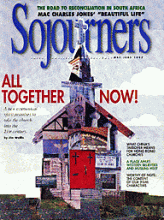Jim Wallis has done an outstanding job of describing the new ecumenism that is fostering dialogue among black, mainline Protestant, Catholic, evangelical, and Pentecostal churches. I’d like to assess the impact of this movement within the context of historically African-American churches.
The basic concept outlined by Wallisùthat denominationalism with its rigid hierarchical structure and top-down management style is giving way to a grassroots, horizontal method of relatingùis accurate. However, this is not a new phenomenon in the black church.
The civil rights movement of the late 1950s and early 1960s had at its center a warfare within the black Baptist denomination. Dr. Martin Luther King Jr. began his rise to prominence within the National Baptist Convention before national attention was drawn to him through the Montgomery bus boycott. In fact, King was the product of a family with deep roots, visibility, and power in this largest and most influential black denomination. With the onset of the Montgomery bus boycott, King sought to develop the National Baptist Convention into a vehicle that could give religious leadership to the struggle for justice in the way that the NAACP provided secular guidance.
King’s dream was not to be realized as denominational politics found him in a titanic struggle with the president of the National Baptist Convention, Dr. Joseph H. Jackson. King was eventually banished from the Convention, and he and his supporters founded the Progressive National Baptist Convention, a group that is chartered to do justice and address issues of civil rights.
Read the Full Article

